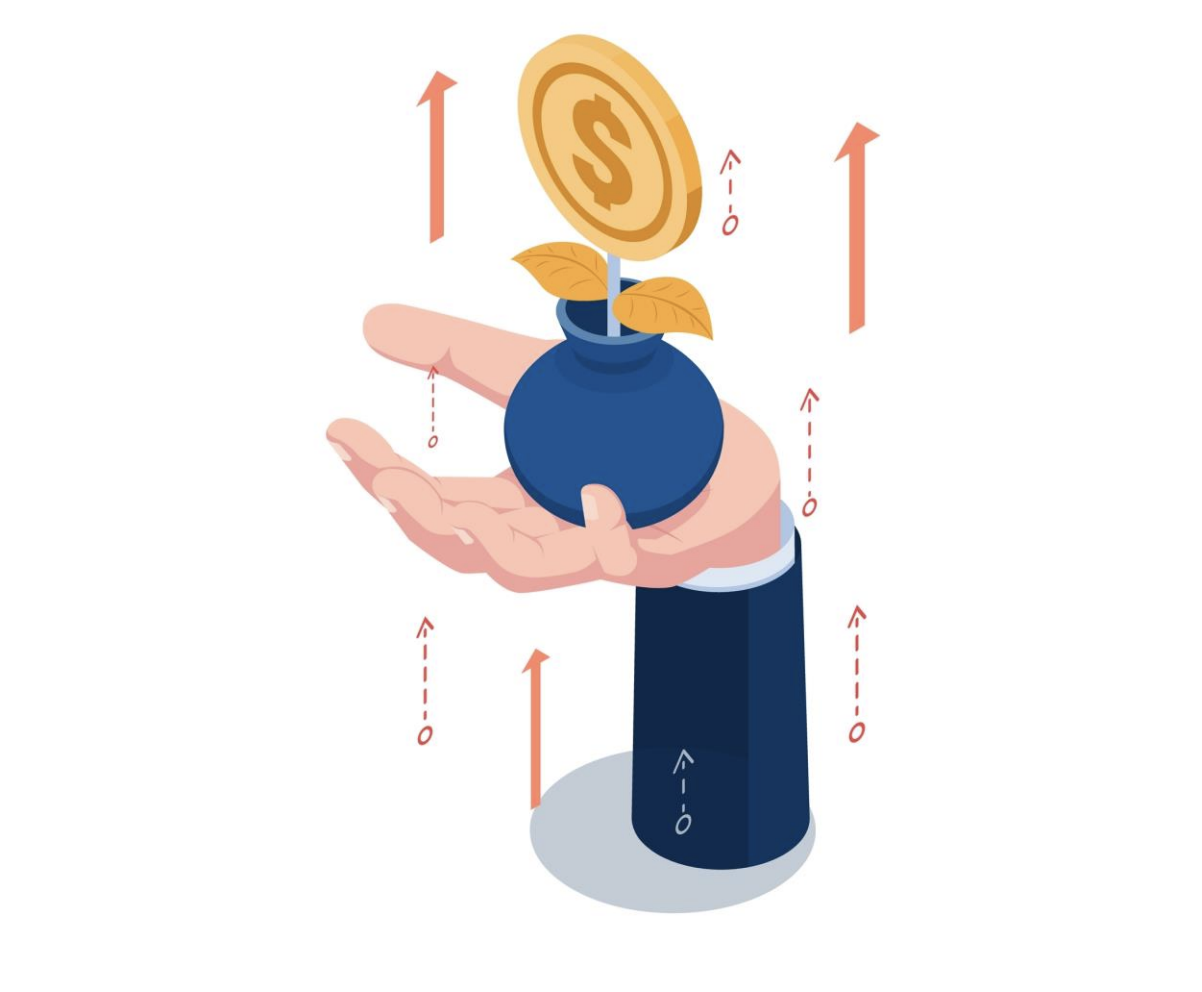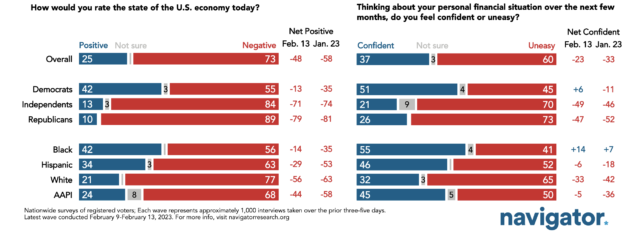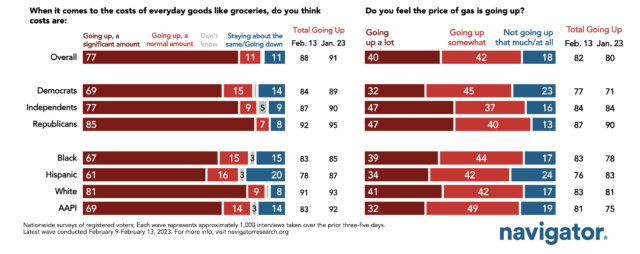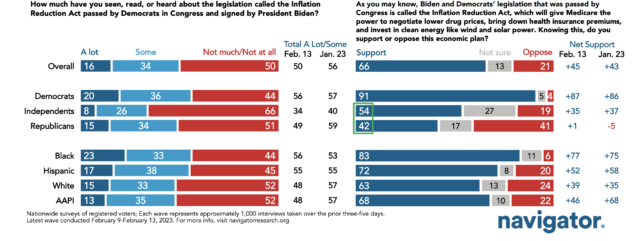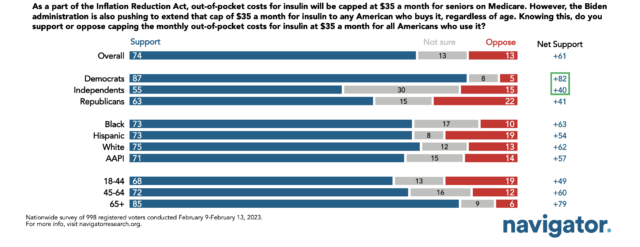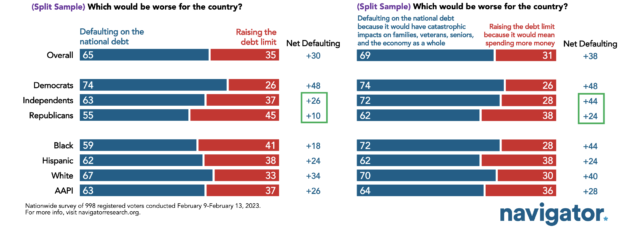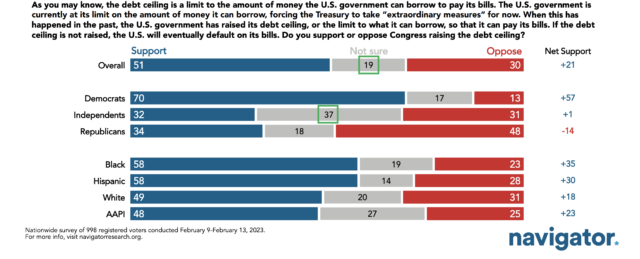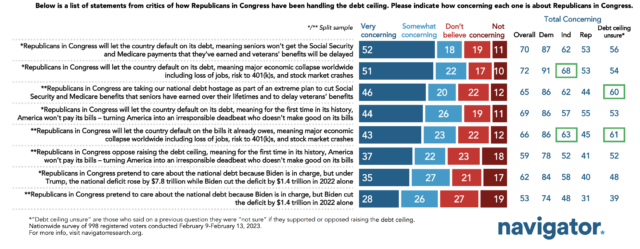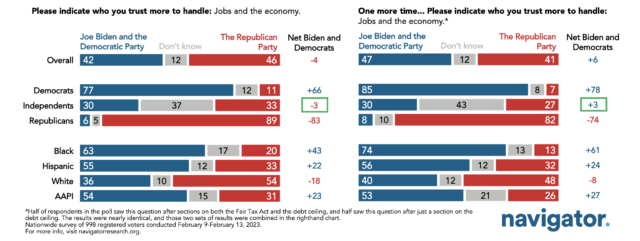- Views of the economy and personal finances remain negative as Americans say gas and grocery costs are still on the rise.
- The Inflation Reduction Act remains broadly popular though fewer are hearing about it, and majorities across party and age support expanding the insulin price cap of $35 a month to any Americans who count on insulin.
- Majorities say defaulting on the debt ceiling would be worse than raising the debt ceiling, and a majority support raising the debt ceiling, though one in five do not know enough to say.
- The biggest concerns on House Republicans’ behavior around the debt ceiling center on the consequences of default, including seniors not getting Social Security and Medicare payments and the risk of a major economic collapse.
Americans’ Views of the Economy and Personal Financial Situations Remain Deeply Negative, Though Slightly Improved
Though there are slight improvements since late January, still majorities rate the national economy and their personal finances negatively.
- More than eight in ten independents rate the national economy negatively (84%), and seven in ten say they feel uneasy about their personal financial situation (70%).
Americans Continue to Say Gas and Grocery Prices Are Increasing
Nearly nine in ten (88%) say the costs of everyday goods like groceries are going up, and 82% say the same about the price of gas.
The Inflation Reduction Act Remains Popular Among Bipartisan Pluralities, Though Fewer Are Hearing About It
There has been a slight decline in the share who report hearing about the Inflation Reduction Act since late January (from 56% “a lot” or “some” to 50%), with the most pronounced decline among independents (from 40% to 34%) and Republicans (from 59% to 49%). • Still, nine in ten Democrats (91%), more than half of independents (54%), and a plurality of Republicans (42%) support the plan.
Overwhelming Majorities Across Age, Race, and Party Support Capping Insulin Costs to $35 a Month for All Americans
Nearly nine in ten Democrats (87%) support capping insulin costs for “any American who buys it, regardless of age,” along with clear majorities of Republicans (63%) and independents (55%).
- Support is higher among seniors (85%) than Americans under 45 (68%), though majorities of every age group support the policy.
Two in Three Say Defaulting on the Debt Would Be Worse Than Raising the Debt Limit, With or Without Messaging
Including information about the “catastrophic impacts” of a default boosts the share who say that defaulting would be worse, though majorities say “defaulting on the national debt” would be worse with or without messaging included.
- Additional information increases the share of independents who say default would be worse by a net 18 points (from net +26 defaulting would be worse to net +44) and the share of Republicans who say the same by net 14 points (from net +10 to net +24).
A Majority of Americans Support Raising the Debt Ceiling, Though One in Five Are Not Sure
A large majority of Democrats support raising the debt ceiling (70% support), while independents are split (32% support vs. 31% oppose, while another 37% are not sure); one in three Republicans (34%) also support raising the debt ceiling.
Loss of Social Security/Medicare, Economic Collapse Most Concerning on House Republicans’ Debt Ceiling Behavior
For those unsure of whether they support raising the debt ceiling*, the strongest arguments focus on Republicans holding the economy hostage to cut Social Security/Medicare (60% concerning) and letting the country default on its bills and causing economic collapse (61%).
Trust in Democrats to Handle Economy Increases After Messaging Critical of House GOP Stance on Debt Ceiling
After reading messaging about where Congressional Republicans stand on the debt ceiling, trust in Biden and Democrats to handle “jobs and the economy” increases by a net 10 points (from net +4 Republicans to net +6 Biden and Democrats).
- Independents trust the Republican Party by 6 points less after messaging (from 33% trust the Republican Party more to 27%).
About The Study
Global Strategy Group conducted public opinion surveys among a sample of 998 registered voters from February 9-February 13, 2023. 99 additional interviews were conducted among Hispanic voters. 74 additional interviews were conducted among Asian American and Pacific Islander voters. 99 additional interviews were conducted among African American voters. 99 additional interviews were conducted among independent voters.
